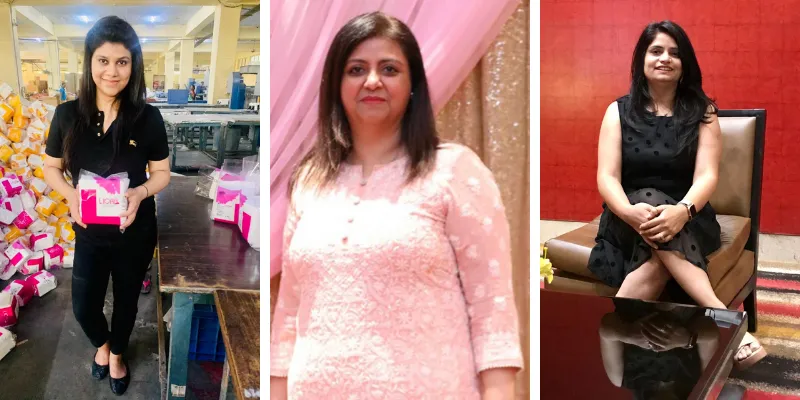[Year in Review 2021] How women entrepreneurs pivoted during the pandemic and saw tangible results
As the year ends, HerStory takes a look at how women entrepreneurs braved the challenges of the pandemic, pivoted their business and are now looking at the future with optimism.
While the COVID-19 pandemic has not been easy on the world, it has particularly been difficult for women. They have borne the brunt of multi-tasking, between home and work, battling mental health issues while adjusting to an unprecedented new normal.
Women entrepreneurs have had to face multiple issues as well – how to keep their small and medium businesses afloat while grappling with emotional concerns like whether to cut staff salaries, let go of employees or deal with a dip in family income.

Shivani Agarwal, Rhea Punjabi and Rakhi Khera
According to the World Bank’s Enterprise Survey dashboard (March 2021), women-led businesses have generally seen larger declines in sales and profits during the pandemic, and they have been more likely to close down (at least temporarily) in 12 out of 18 countries.
Similarly, an upcoming World Bank paper in an in-depth study of 49 mostly low and middle-income countries, shows that women-led businesses were disproportionately affected by the pandemic, especially among micro-businesses and those in the hospitality industry.
In this scenario, women entrepreneurs have also stood out in their efforts to pivot and persist – with ingenuity, innovation, and determination to stay on course. Whether it’s branching out into subsidiary functions, changing operational styles, or revisiting strategies, they have steered their businesses with optimism and vigour.
HerStory examines how these women stayed on course while surmounting diverse challenges of an unknown pandemic.
‘Essentials’ stuff
When India was looking for different ways to co-exist with the coronavirus, innovators were working hard to meet the demand for essentials.
Mumbai-based Saral Designs founded by Suhani Mohan and Kartik Mehta offered a fully automatic and compact machine to enable decentralised production of sanitary napkins with five variants – Swacch 12, Swacch 1.2, Swachh 3.0, Swachh 4.0, Swachh 5.0 and Swachh 7.0.
In March 2020, as soon as the pandemic hit the world, the company repurposed Swachh 7.0 to only produce 3-ply surgical masks, with each machine producing 40 masks a minute. Priced between Rs 4 and Rs 10, the company worked with local NGOs and the government to set up Swachh manufacturing machines.
When Vanshika Choudhary shifted base from Delhi to Mumbai to manage her apparel startups, KYNA and KYNA uniforms, little did she anticipate that the pandemic would turn (business) life upside down. She had almost 500 restaurants, hotels and schools as her clients, and things changed overnight.
“Every day, there were headlines of PPE and imports being banned and that is when we started educating ourselves about the material, usage and how to make it because it is a very specialised product. We had to be very careful because we are responsible for the people wearing them,” Vanshika says.
When PPE kits became an immediate need, Vanshika, along with her husband Abhijeet launched KNYA MED, and in eight months, sold almost 6 lakh PPE kits to over 250 hospitals. Priced between Rs 300 and Rs 700, the duo also donated 25 percent of KNYA MED’s revenues to meet the needs of areas badly affected by the virus.
Shivani Agarwal established Scraft Products as an MSME (micro, small and medium enterprises) unit in 2010 to manufacture disposables like tissue paper, toilet and kitchen rolls, cling film and aluminum foil.
Speaking about the challenges faced during the pandemic, Shivani says, “Procurement of raw materials, work passes and licences as well as supply chain disruptions were some of the initial hurdles.”
She worked on accelerating Scarft’s digitisation journey and explored online selling for business continuity and market access and was also introduced to the Walmart Vriddhi program.
Shivani pivoted to manufacturing hand sanitisers and sanitising wipes using her existing business network. “This helped sustain the brand and also look after the 70 employees at Scraft while contributing to the bottom line of the company,” she adds.
Making (new) business sense

Laksheeta Govil, Nidhi Yadav and Shivaarti
In 2019, Nidhi Yadav’s contemporary ethnic wear label for women, AKS crossed Rs 100 crore in revenue, making it one of Indian ecommerce’s biggest successes.
A year later, the pandemic struck and e-commerce platforms delivered only essentials for 45 days, and Nidhi too had to face a never-before kind of situation. The company started manufacturing PPE kits so that production did not come to a halt. The brand was also among the first to offer coordinated masks along with outfits that came as a surprise to buyers.
“The pandemic helped us to grow horizontally. During the second lockdown, when everything closed suddenly, our production was hampered drastically. We had a lot of waste fabric with us from the women’s garments we produced. We created a whole new kidswear range from that fabric and upcycled collection that became a huge hit,” she says.
“We have grown 25-30 percent during the pandemic, and are expected to clock Rs 160 crore revenues this fiscal,” Nidhi adds.
Shivaarti Bajaj of entertainments tech startup GoParties pivoted and rebranded the company as a digital entertainment platform for content creators, called BoxEngage, an alternative to TikTok.
The platform allows content creators on BoxEngage to make short and long recorded videos, livestream, and also offers influencers a medium to host private sessions with their followers.
Rakhi Khera started Abiti Bella, an online fashion brand in 2014 with an initial investment of just Rs 5 lakh. Soon, it became a top seller on Myntra, clocking an impressive Rs 3.6 crore in revenue in 2019.
When the lockdowns were announced in March 2020, her online business went into a total shutdown.
“During this period, there were no online sales for more than two months, and people only spent on necessities. My business went to zero,” she recalls.
After discussions with family, they decided to manufacture and sell overalls that could be used by domestic workers in low-risk zones during this period.
The important thing was keeping the business afloat and paying salaries to staff on time. She also decided to focus on a range of lounge wear, lingerie, and T-shirts for people working from home.
Harnessing the power of social media
With the internet often the sole medium of communication, women entrepreneurs also took to social media in a big way to pivot their businesses.
Laksheeta Govil is the founder of Fizzy Goblet, a handcrafted footwear label, Since Facebook and Instagram were important for business, with around 345,000 followers on Instagram alone, Laksheeta's aim was to keep the content fresh.
“We focused on engaging activities that our followers could do during the lockdown – new concepts like Sunday DIY days and Fizzy Kitchen, and organised live sessions with collaborators like Payal Singhal, Tribe Amrapali and Rahul Mishra," she says.
Rhea Punjabi, Co-founder of ADA Design Chikan Studio, a Lucknow-based brand, used Facebook Messenger to connect with existing and potential customers and also resolve queries. The brand also used IGTV to showcase fresh collections and the Facebook Ad Manager to customise audiences and target them with appropriate products.
The past one-and-a-half years have been tough on women entrepreneurs but their strength and resilience have shone through. While the numbers may be dismal, there is hope, yet!
Edited by Affirunisa Kankudti


![[Year in Review 2021] How women entrepreneurs pivoted during the pandemic and saw tangible results](https://images.yourstory.com/cs/4/8e7cc4102d6c11e9aa979329348d4c3e/Cover-05-1639653048479.png?mode=crop&crop=faces&ar=2%3A1&format=auto&w=1920&q=75)
![[Year in Review 2021] From spurt in BNPL loans, to growth in early-stage companies: trends that defined fintech in 2021](https://images.yourstory.com/cs/2/f49f80307d7911eaa66f3b309d9a28f5/Imagetemplateforself21-1639499803610.png?fm=png&auto=format&h=100&w=100&crop=entropy&fit=crop)




